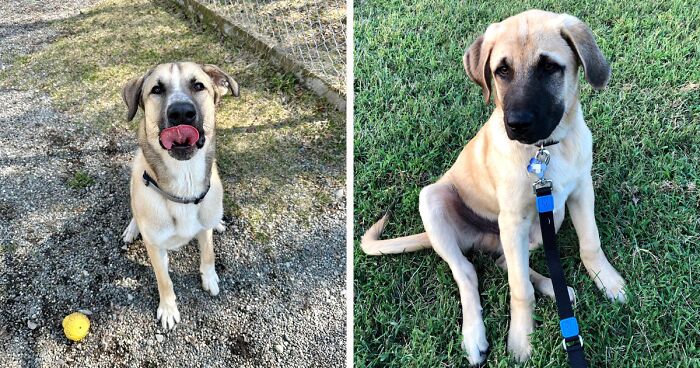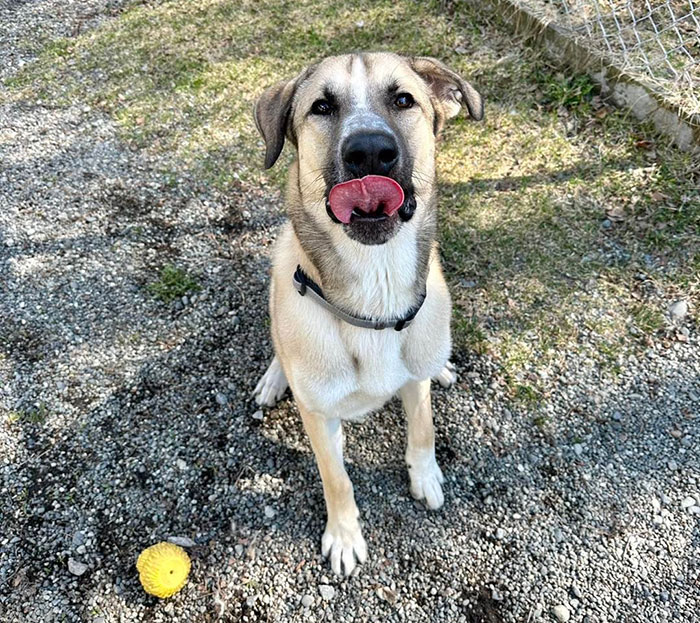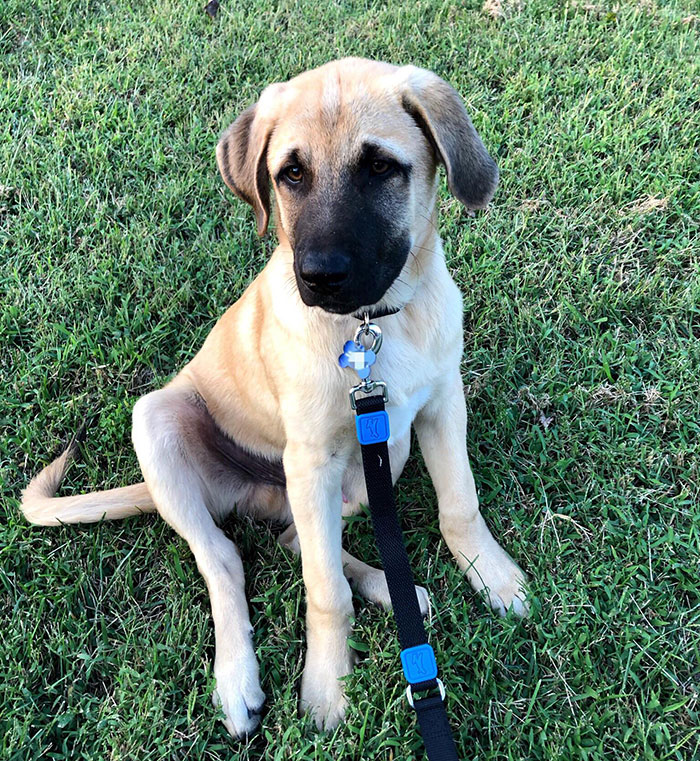The Anatolian Shepherd Dog is an ancient breed hailing from the Anatolian region in Turkey, with a rich history as a livestock guardian and working breed. Also known as a Turkish shepherd’s dog.
This working dog is known for its rugged appearance with a black masked face, it’s large size, strength, and unwavering loyalty and has evolved from its ancient roots to become a cherished companion and protector.
- Originates from Turkey, revered for guarding livestock.
- Temperament includes independence, loyalty, protection.
- Prone to hip dysplasia, entropion, and ear issues.
- Robust double coat requires regular grooming.
- Socialization is key for their guarding instincts.
In this comprehensive guide, we delve into various aspects of dog breed information, offering insights into its temperament, health, care, and grooming.
The information provided herein is for informational purposes only. Please refer to our disclaimer for more details..
History of The Anatolian Shepherd Dog
Image credit: anchorageanimal
The Anatolian Shepherd Dog, hailing from the Anatolian region of Turkey, boasts a rich history deeply intertwined with the nomadic lifestyle of ancient shepherds. Revered for their exceptional guarding abilities, Anatolians have safeguarded livestock from predators for thousands of years.
Bred to withstand harsh climates and challenging terrains, these dogs have become an integral part of Turkish culture. Anatolian Shepherds have been bred for their size, strength, and independent nature for many generations. All traits that aided them in protecting herds of sheep and goats. A loyal Anatolian will face even a wolf if necessary to protect its flock.
You can trace their lineage back to ancient times, showcasing their enduring significance as loyal guardians throughout canine history. Today’s Anatolian continue to uphold their esteemed legacy as both devoted family companions and reliable flock guardians.
Dog Breed Temperament
The Anatolian Shepherd’s temperament is a fascinating blend of independence, intelligence, and unwavering loyalty. As a breed developed to guard livestock, their natural instinct is to be vigilant and protective and they tend to be suspicious of strangers. However, they are also known for their calm, composed demeanour and thoughtful approach to almost all situations.
Guardianship Instincts
Anatolian Shepherds are renowned for their exceptional guardianship instincts. Rooted in their historical role as a guardian breed in the harsh Anatolian region, these dogs have retained a strong sense of responsibility.
They are instinctively wary of strangers and possess an innate ability to assess potential threats even with little dog training. They are also bred not to back down from a threat, be it from a predator or another dog, meaning it is essential to ensure your dog thoroughly socialized if you choose this protective breed – especially if you are planning on bringing it to a dog park.
Loyalty
Loyalty is a hallmark trait of Anatolian Shepherds and they are notoriously loyal to their families. Once they bond with their family or flock, they are unwavering in their dedication. This loyalty extends not only to the humans they consider part of their pack but also to the animals under their protection.
It is not rare to see an Anatolian preferring to sleep outside with the livestock animals rather than inside with their human family. It is all part of their nature, and with their thick undercoat and tough outer coat they can handle almost any weather.
Independence
Anatolian Shepherds are independent thinkers. This characteristic served them well in their historical role, where split-second decision-making was crucial to keep their flock safe. While their independence can be an asset, it also requires a consistent and firm approach to training from early on. Put plainly, if the Anatolian thinks you are wrong, it will ignore you.
You should, therefore, start training your Anatolian Shepherd puppy early if you wish to have a protective livestock guardian dog that will also listen to you.
Family Dynamics
When integrated into a family setting, Anatolian Shepherds often exhibit a gentle and affectionate side, and are especially good with children they consider part of their family. Early socialization is vital to ensure they understand acceptable behaviour in various situations and realize their significant size compared to human children.
Anatolian Shepherd Health
Image credit: luckydogrefuge
Anatolian Shepherds are large dogs, each individual dog growing up to 30 inches tall and weighing from 80 to 140 lbs.
However, despite their size, the Anatolian Shepherds are generally healthy dogs, but like all breeds, they are susceptible to specific health conditions. Responsible breeding practices and regular veterinary check-ups contribute significantly to their overall well-being.
Some diseases known to affect the Anatolian Shepherd include hip dysplasia, entropion, and ear issues.
Hip Dysplasia
Hip dysplasia in dogs is a common orthopaedic condition that affects the hip joint’s proper functioning. It occurs when the hip joint doesn’t develop correctly, leading to instability and degeneration.
Large and giant breeds, like the Anatolians, are more prone, and genetics often play a role.
Symptoms include lameness, difficulty rising, and decreased activity. Early detection through regular veterinary check-ups is crucial to prevent issues. Treatment options range from weight management and physical therapy to surgical interventions. Proper care and preventive measures can improve a dog’s quality of life and manage the impact of hip dysplasia.
Entropion
Anatolian Shepherds may be prone to entropion. Entropion in dogs is an eye condition where the eyelid rolls inward, causing irritation and discomfort. Common in certain breeds, like the Anatolian Shepherd, it can lead to corneal damage and vision impairment.
Symptoms include excessive tearing, squinting, and rubbing the eyes. Surgical correction is often necessary to alleviate the condition and prevent complications.
Regular veterinary check-ups are essential for early detection and intervention, ensuring a better quality of life for dogs affected by entropion.
Ear Health
As with many breeds, ear health is crucial for Anatolian Shepherds. Regular cleaning and checks can prevent ear infections, especially when they are living a mainly outdoor lifestyle.
However, if you feed your Anatolian Shepherd a healthy diet and ensure they receive regular health checks at a veterinarian, you can help keep your friend happy and healthy.
Breed Care and Grooming
Caring for an Anatolian Shepherd requires an understanding of their unique needs.
Grooming
Their double coat, designed to withstand varying climates, sheds moderately. Regular brushing helps manage shedding and prevents matting when you remove dead hair. During shedding seasons twice a year, more frequent brushing is advisable, at least two or three times per week.
This may take a bit of time as the Anatolian Shepherd is a large dog an they may not always enjoy the brushing, which is why it is vital to include grooming as part of obedience training.
Bathing
This protective dog breed are naturally clean dogs and don’t require frequent baths. However, regular grooming, including checking and cleaning ears, trimming nails, and dental care, is essential for their overall well-being.
Training and Socialization of an Anatolian Shepherd
Anatolian Shepherds excel in environments where the owners prioritize early socialization and positive reinforcement training. Exposure to various people, environments, and experiences helps them develop into well-rounded, confident individuals.
Many Anatolian Shepherds also benefit from learning from an older, experienced dog – especially if they are to become great guardian dogs.
Anatolians as Guard Dogs
Image credit: little-ladybug
Anatolian Shepherds, renowned for their guarding abilities, have a rich history as livestock protectors. Originating in Turkey, these formidable dogs have been bred for centuries to guard flocks from predators. With a keen instinct for threat detection, Anatolians exhibit a natural protective demeanour.
Their guarding prowess lies, of course, in their imposing size, strength, and assertive temperament. But also in their loyalty and strong bond with the animals under their watch, making them invaluable partners to shepherds and farmers. Combined with this breed’s natural wariness of strangers, along with their courage, it makes them exceptional guardians.
Anatolian Shepherds employ various techniques to fulfil their guarding role, including patrolling the perimeter along the fence, vocalizing warnings through barking, and, when necessary, intervening decisively to protect their flock of sheep or other livestock.
Their presence alone is often a sufficient deterrent, as their imposing stature and assertive demeanour command respect.
While Anatolians are gentle and affectionate with their human families, their guarding instincts remain crucial to their temperament.
Early socialization and training are essential to channel their protective nature appropriately. These remarkable dogs exemplify the perfect blend of a loving companion and a steadfast guardian, making them an ideal choice for those seeking a loyal protector for their homes and livestock.
How to Choose the Right Dog Breed
Choosing the right dog breed is a significant decision that involves carefully considering various factors to ensure a harmonious match between the dog and its human companions. Future dog owners must consider lifestyle, living space, activity level, and personal preferences.
Different breeds have distinct energy levels, exercise requirements, and temperaments. For instance, an active individual who enjoys outdoor activities might find joy in a more energetic and athletic breed like a Labrador Retriever rather than an Anatolian Shepherd.
Living space is another critical factor. Anatolian Shepherds may thrive in spacious homes with yards, while smaller or less active breeds may adapt well to apartment living.
The activity level of the chosen breed should align with the owner’s preferences. Some breeds require vigorous daily exercise, while others are content with shorter walks. The Anatolian Shepherd working as a guard dog rarely needs long walks and is content with walking the grounds’ perimeter.
Personal preferences, such as whether one desires a more independent or affectionate breed, also play a role. Researching breed characteristics, consulting with veterinarians or breeders, and even spending time with dogs of the chosen breed can provide valuable insights. Especially when considering a breed like the Anatolian Shepherd, it is essential to meet the dogs and owners before adopting a puppy or adult dog.
Adopting Anatolian Shepherds
Adopting an Anatolian Shepherd requires careful consideration of their unique traits. Families with older children and experience handling large, independent breeds may find them to be devoted and protective companions and valuable guardians.
Anatolian Shepherds thrive in roles where they can fulfil their guardian instincts. Whether protecting livestock on a farm or providing vigilant watchfulness in a suburban setting, they excel when they have a purpose.
When adopting an Anatolian Shepherd, it is recommended to always research reputable breeders before buying to minimize the risk of genetic diseases and other issues.
Conclusion
The Anatolian Shepherd’s rich history and distinctive characteristics are a testament to the enduring partnership between humans and their canine companions. Their protective nature, loyalty, and robust build make them an excellent choice for families seeking a devoted and watchful guardian.
However, it should be stressed that the Anatolian Shepherd is not considered a beginner dog breed and should only be adopted if you can provide them with the correct lifestyle, preferably where they can function as guard dogs.
With careful consideration an Anatolian Shepherd can become a much valued and loving member of your family.
513views
Share on Facebook
 Dark Mode
Dark Mode 

 No fees, cancel anytime
No fees, cancel anytime 





















































0
0